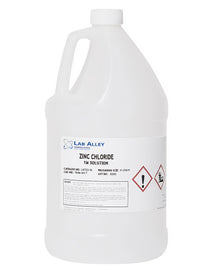Zinc Chloride
Inorganic Compound Composed Of Zinc And Chlorine
About Zinc Chloride
Zinc chloride (ZnCl2) is an inorganic compound composed of zinc and chlorine. It is a white crystalline solid that is highly soluble in water. Zinc chloride is produced by the reaction of zinc with hydrochloric acid or by the direct combination of zinc and chlorine gas.

Common Uses And Applications
Zinc chloride has various applications in different industries due to its unique properties:
- Galvanizing: Zinc chloride is used in the galvanizing process, which involves coating iron or steel with a protective layer of zinc. This helps prevent corrosion and extends the lifespan of the metal.
- Metal Etching: Zinc chloride is employed as an etching agent for metals like zinc, brass, and copper. It is used to create fine patterns or designs on the surface of these metals.
- Flux: Zinc chloride serves as a flux in soldering and welding applications. It helps remove oxides from metal surfaces, allowing better bonding between the metals.
- Wood Preservation: Zinc chloride is used as a wood preservative to protect against fungal and insect attacks. It is commonly applied to utility poles, railroad ties, and other wooden structures.
- Battery Production: Zinc chloride is used as an electrolyte in certain types of batteries, such as zinc-carbon and zinc-chloride batteries.
- Chemical Synthesis: Zinc chloride is a versatile reagent in organic synthesis. It is used as a Lewis acid catalyst in various chemical reactions, including the Friedel-Crafts acylation and chlorination reactions.
- Dehydrating Agent: Zinc chloride has strong hygroscopic properties, meaning it readily absorbs moisture from the air. It is used as a desiccant or dehydrating agent in some applications.
- Medical Applications: In medicine, zinc chloride is used in certain dental products as an antiseptic and disinfectant. It may also be used in some topical antiperspirants and astringents.
Filters






